 W
W"Allons à Lafayette" is the B-side of a 78rpm single recorded by Joe Falcon and Cléoma Breaux in 1928. The song is based on an older traditional tune called "Jeunes gens campagnard". While there is some mystery on the reason Okeh Records didn't release Dr. James F. Roach's songs in 1925, "Allons à Lafayette" is officially known as the first commercial Cajun song to be recorded. It was included in the reference book 1001 Songs You Must Hear Before You Die
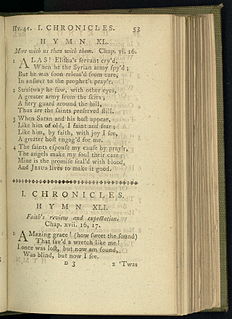 W
W"Amazing Grace" is a Christian hymn published in 1779, with words written in 1772 by the English poet and Anglican clergyman John Newton (1725–1807). It is an immensely popular hymn, particularly in the United States, where it is used for both religious and secular purposes.
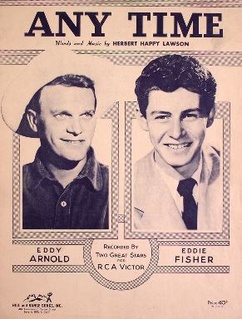 W
W"Any Time" is a country song written by Herbert "Happy" Lawson. The song was published in 1921 and first recorded by Emmett Miller for OKeh Records in 1924. Accompanying himself on ukulele, Lawson recorded his own version for Gennett Records on July 31, 1925.
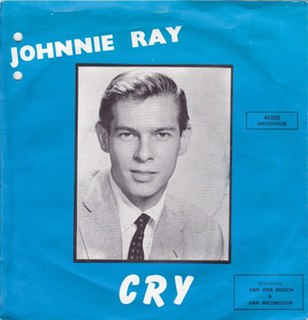 W
W"Cry" is a 1951 popular song written by Churchill Kohlman. The song was first recorded by Ruth Casey on the Cadillac label. The biggest hit version was recorded in New York City by Johnnie Ray and The Four Lads on October 16, 1951. Singer Ronnie Dove also had a big hit with the song in 1966.
 W
W"Don't Say Goodbye" is a song by Brazilian musician Sérgio Mendes, featuring vocals from American singer John Legend. was released on August 29, 2014 as the lead single of his nineteen studio album Magic, with the record label OKeh Records. The song was produced by Mendes.
 W
W"Elmer's Tune" is a 1941 big band and jazz standard written by Elmer Albrecht, Dick Jurgens and Sammy Gallop. Glenn Miller and his Orchestra and Dick Jurgens and his Orchestra both charted with recordings of the composition.
 W
W"Fishing Blues" is a blues song written in 1911 by Chris Smith, who is best known for "Ballin' the Jack". "Fishing Blues" was first recorded in 1928 by Henry Thomas "Ragtime Texas" on vocals and guitar with the introduction and breaks played on quills, a type of panpipe.
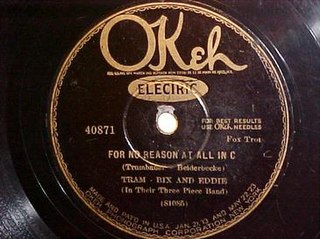 W
W"For No Reason at All in C" is a 1927 jazz instrumental by Bix Beiderbecke, Frankie Trumbauer, and Eddie Lang. The song was released as a 78 single in 1927 on Okeh Records as by "Tram, Bix and Eddie ".
 W
W"Good Golly, Miss Molly" is a hit rock 'n' roll song first recorded in 1956 by the American musician Little Richard and released in January 1958 as Specialty single 624 and next in July 1958 on Little Richard. The song, a jump blues, was written by John Marascalco and producer Robert "Bumps" Blackwell. Although it was first recorded by Little Richard, Blackwell produced another version by the Valiants, who imitated the fast first version recorded by Little Richard, not released at that time. Although the Valiants' version was released first, Little Richard had the hit, reaching #4. Like all his early hits, it quickly became a rock 'n' roll standard and has subsequently been recorded by hundreds of artists. The song is ranked #94 on the Rolling Stone magazine's list of the 500 Greatest Songs of All Time.
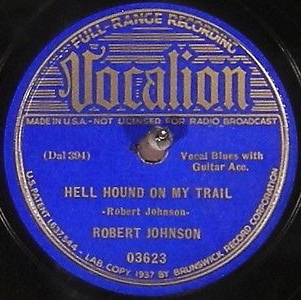 W
W"Hellhound on My Trail" is a blues song recorded by Mississippi Delta bluesman Robert Johnson in 1937. It was inspired by earlier blues songs and blues historian Ted Gioia describes it as one of Johnson's "best known and most admired performances—many would say it is his greatest".
 W
W"I Can't Give You Anything but Love, Baby" is an American popular song and jazz standard by Jimmy McHugh (music) and Dorothy Fields (lyrics). The song was introduced by Adelaide Hall at Les Ambassadeurs Club in New York in January 1928 in Lew Leslie's Blackbird Revue, which opened on Broadway later that year as the highly successful Blackbirds of 1928, wherein it was performed by Adelaide Hall, Aida Ward, and Willard McLean.
 W
W"I Feel So Bad" is a blues song written and originally recorded by Chuck Willis, and released in 1954. It rose to No. 8 on the Billboard Rhythm & Blues Chart in early 1954, and appears on the album Chuck Willis Wails the Blues.
 W
W"I Put a Spell on You" is a 1956 song written and composed by Jalacy "Screamin' Jay" Hawkins, whose own recording of it was selected as one of the Rock and Roll Hall of Fame's 500 Songs that Shaped Rock and Roll. It was also included in Robert Christgau's "Basic Record Library" of 1950s and 1960s recordings—published in Christgau's Record Guide: Rock Albums of the Seventies (1981)—and ranked No. 313 on Rolling Stone magazine's list of The 500 Greatest Songs of All Time. The selection became a classic cult song covered by a variety of artists and was his greatest commercial success, reportedly surpassing a million copies in sales, even though it failed to make the Billboard pop or R&B charts.
 W
W"I Saw the Light" is a country gospel song written by Hank Williams. Williams was inspired to write the song while returning from a concert by a remark his mother made while they were arriving in Montgomery, Alabama. He recorded the song during his first session for MGM Records, and released in September 1948. Williams' version did not enjoy major success during its initial release, but eventually it became one of his most popular songs and the closing number for his live shows. It was soon covered by other acts, and has become a country gospel standard.
 W
W"I'm Always Chasing Rainbows" is a popular Vaudeville song. The music is credited to Harry Carroll, but the melody is adapted from Fantaisie-Impromptu by Frédéric Chopin. The lyrics were written by Joseph McCarthy, and the song was published in 1917. It was introduced in the Broadway show Oh, Look! which opened in March 1918. The song was sung in the show by the Dolly Sisters. Judy Garland sang it in the 1941 film Ziegfeld Girl. It was subsequently sung by Jack Oakie in the 1944 film The Merry Monahans and was again featured in the 1945 film The Dolly Sisters, where it was sung by John Payne. It was also included for part of the run of the 1973 revival of Irene.
 W
WJunker Blues is a piano blues song first recorded in 1940 by Champion Jack Dupree. It formed the basis of several later songs including the 1949 "The Fat Man" by Fats Domino and the 1952 "Lawdy Miss Clawdy" by Lloyd Price. The song is about a drug user's conflict with life and the law, makes references to cocaine, "needles", "reefers", and life in the penitentiary, and contains admonishments against the use of hard drugs.
 W
W"Key to the Highway" is a blues standard that has been performed and recorded by several blues and other artists. Blues pianist Charlie Segar first recorded the song in 1940. Jazz Gillum and Big Bill Broonzy followed with recordings in 1940 and 1941, using an arrangement that has become the standard.
 W
W"Little Brown Jug" is a song written in 1869 by Joseph Eastburn Winner, originally published in Philadelphia with the author listed as Winner's middle name "Eastburn".
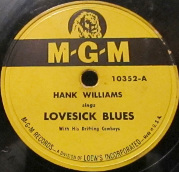 W
W"Lovesick Blues" is a show tune written by Cliff Friend and Irving Mills. The song first appeared in the 1922 musical Oh, Ernest. It was first recorded by Elsie Clark and then by Jack Shea. Emmett Miller recorded it in 1925 and 1928, followed by country music singer Rex Griffin circa 1938. The recordings by Griffin and Miller inspired Hank Williams to perform the song during his first appearances on the Louisiana Hayride radio show in 1948. Receiving an enthusiastic reception from the audience, Williams decided to record his own version despite initial push back from his producer Fred Rose and his band.
 W
W"Margie", also known as "My Little Margie", is a 1920 popular song composed in collaboration by vaudeville performer and pianist Con Conrad and ragtime pianist J. Russel Robinson, a member of the Original Dixieland Jazz Band. Lyrics were written by Benny Davis, a vaudeville performer and songwriter. The song was introduced by the Original Dixieland Jazz Band in 1920 as Victor 78, 18717-A, in a medley paired with "Singin' the Blues". The B side was "Palesteena". The ODJB recorded their instrumental version on December 1, 1920. Other popular versions in 1920-21 were by Gene Rodemich; Eddie Cantor; Ted Lewis; and Frank Crumit. The Rega Dance Orchestra recorded the song in October, 1920 for Okeh Records, 4211.
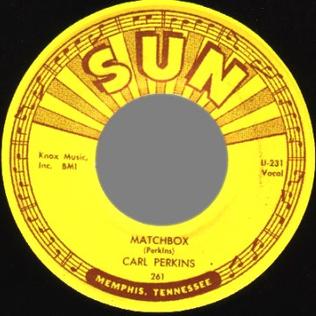 W
W"Matchbox" is a song written and recorded by Carl Perkins and released in 1957. Blind Lemon Jefferson wrote and recorded a song entitled "Match Box Blues" in 1927, which is musically different but which contains some lyric phrases in common.
 W
WOstrich Walk" is a 1917 jazz composition by the Original Dixieland Jass Band released as an instrumental as an Aeolian Vocalion and a Victor 78. Frankie Trumbauer and Bix Beiderbecke recorded the song in 1927. The song is a jazz milestone as one of the first commercially released "jass" or jazz recordings.
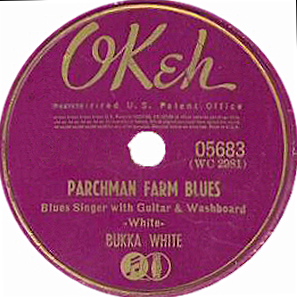 W
W"Parchman Farm" or "Parchman Farm Blues" is a blues song first recorded by American Delta blues musician Bukka White in 1940. It is an autobiographical piece, in which White sings of his experience at the infamous Mississippi State Penitentiary, known as Parchman Farm.
 W
W"Rock Me Baby" is a blues standard that has become one of the most recorded blues songs of all time. It originated as "Rockin' and Rollin'", a 1951 song by Lil' Son Jackson, itself inspired by earlier blues. Renditions by Muddy Waters and B.B. King made the song well-known. When B.B. King's recording of "Rock Me Baby" was released in 1964, it became his first single to reach the Top 40 in Billboard magazine's Hot 100 chart.
 W
W"Rollin' and Tumblin'" is a blues standard first recorded by American singer-guitarist Hambone Willie Newbern in 1929. Called a "great Delta blues classic", it has been interpreted by hundreds of Delta and Chicago blues artists, including well-known recordings by Muddy Waters. Rock musicians usually follow Waters' versions, with the 1960s group Cream's rendition being perhaps the best known.
 W
W"Shake 'Em On Down" is a Delta blues song by American musician Bukka White. He recorded it in Chicago in 1937 around the beginning of his incarceration at the infamous Parchman Prison Farm in Mississippi.
 W
W"Twelfth Street Rag" is a ragtime musical composition published by Euday L. Bowman in 1914.
 W
W"Whole Lotta Shakin' Goin' On" is a song written by Dave "Curlee" Williams and sometimes also credited to James Faye "Roy" Hall. The song was first recorded by Big Maybelle, though the best-known version is the 1957 rock and roll/rockabilly version by Jerry Lee Lewis.